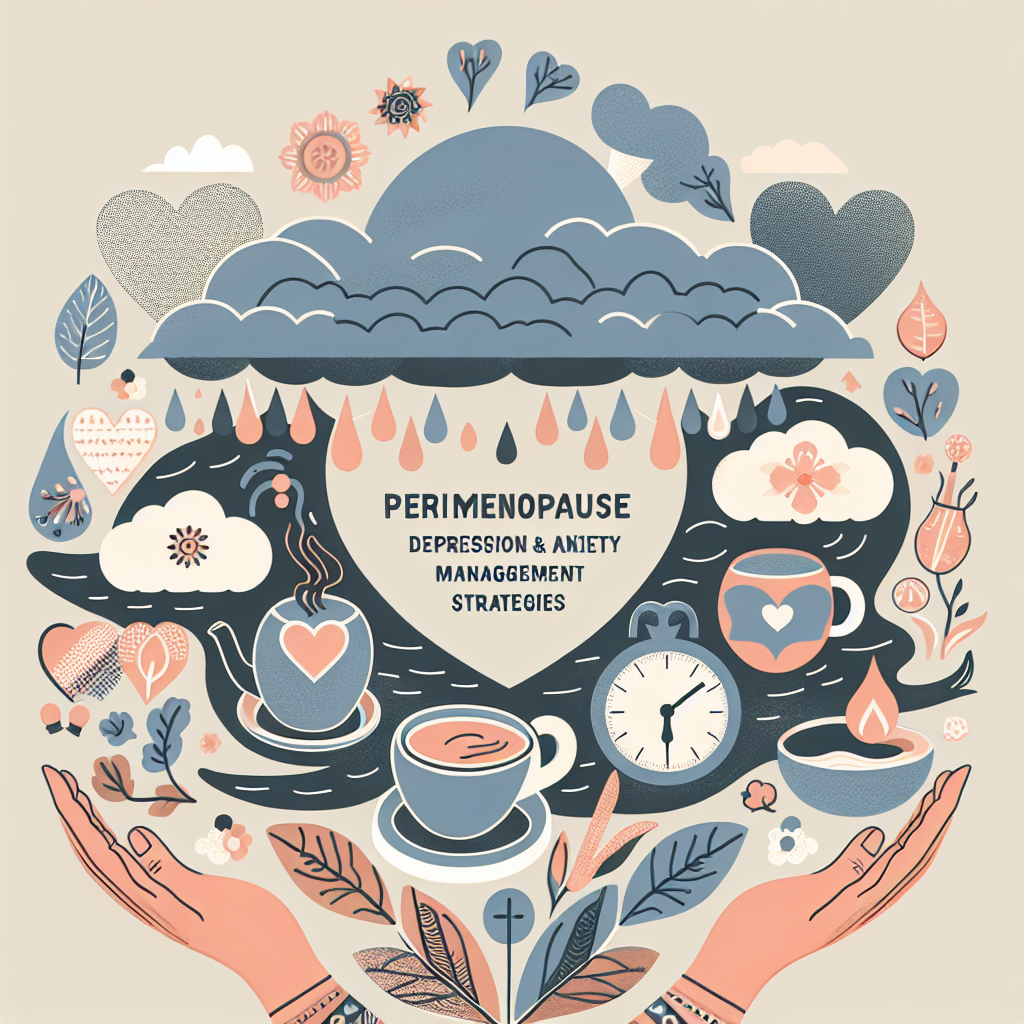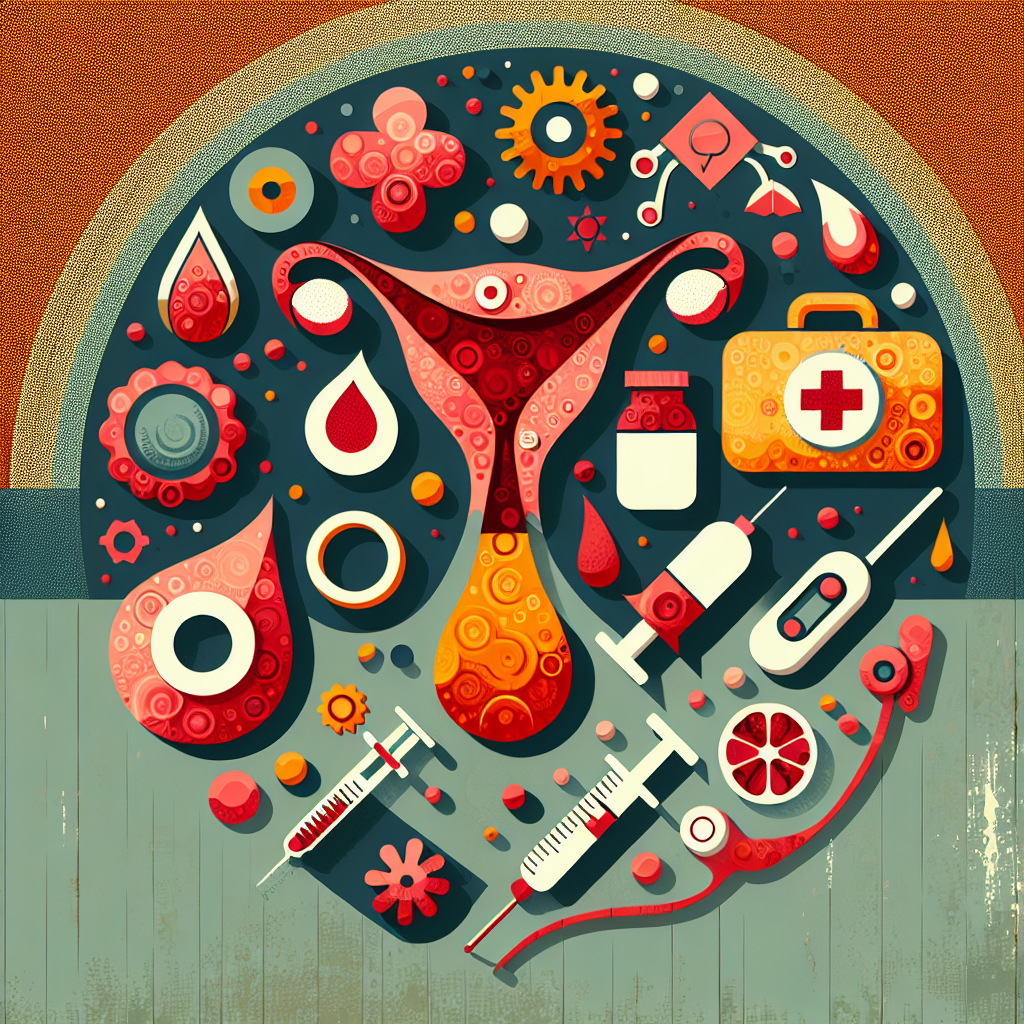
Dive into the Challenges of Depression and Perimenopause Anxiety
This engaging guide offers humor and grace, helping women understand hormonal changes, recognize symptoms, and explore effective strategies for managing emotional ups and downs.
You're not alone in this journey!
Navigating the Storm: Understanding Depression and Perimenopause Anxiety with Grace and Humor
Ladies, let's have a heart-to-heart about something that might be turning your world upside down but isn't getting enough airtime at brunch: depression and perimenopause anxiety. If you've found yourself crying over a toilet paper commercial or lying awake at 3 AM convinced the world is ending because you forgot to buy milk, you're not losing your mind—you might just be experiencing the dynamic duo of hormonal havoc.
The Unexpected Rollercoaster: What's Really Happening
Remember puberty? Well, perimenopause is like puberty's sophisticated, more complex cousin who shows up unannounced with a suitcase full of mood swings and hot flashes. During perimenopause—which can start as early as your late 30s or early 40s—your body begins its gradual transition toward menopause, and your hormones throw quite the farewell party.
Estrogen and progesterone, those hormonal besties that have been with you since adolescence, start playing an erratic game of hide-and-seek. One day they're abundant; the next, they've ghosted you completely. This hormonal rollercoaster doesn't just affect your reproductive system; it impacts your brain chemistry too.
Research published in the Journal of Women's Health shows that women are 2-3 times more likely to experience depression during perimenopause than at other times in their lives. When you combine this with anxiety—which affects up to 51% of women during this transition according to the North American Menopause Society—you've got yourself a perfect storm of emotional turbulence.
"Is It Me, or Is It My Hormones?": Recognizing Depression and Perimenopause Anxiety
How do you know if what you're experiencing is garden-variety stress or something more? Here are some signs that depression and perimenopause anxiety might be at play:
The Depression Dimension:
- Feeling persistently sad or "empty" for weeks
- Losing interest in activities you once enjoyed (yes, even binge-watching your favorite shows)
- Experiencing changes in appetite or weight
- Having trouble sleeping or sleeping too much
- Feeling worthless or excessively guilty
- Having difficulty concentrating or making decisions
- Having thoughts about death or suicide
The Anxiety Avenue:
- Excessive worry that's difficult to control
- Feeling restless or on edge
- Becoming easily fatigued
- Having difficulty concentrating
- Experiencing irritability
- Muscle tension that won't quit
- Sleep disturbances (as if hot flashes weren't disrupting your sleep enough!)
If you're nodding along to several of these symptoms, you're not alone. Depression and perimenopause anxiety often travel together, creating what some women describe as "feeling like a stranger in their own skin."
The Science Behind the Struggle
Let's get nerdy for a moment. Why does perimenopause make us more vulnerable to mood disorders?
Dr. Pauline Maki, a leading researcher in women's mental health, explains that estrogen doesn't just affect reproduction—it influences the production of serotonin, dopamine, and norepinephrine, neurotransmitters that regulate mood. When estrogen fluctuates wildly or declines, these mood regulators can go haywire.
Additionally, the hypothalamic-pituitary-adrenal (HPA) axis, which controls our stress response, becomes more sensitive during perimenopause. This means your body might react to minor stressors as if they were major threats, triggering anxiety responses that feel disproportionate to the situation.
A 2020 study in the journal Menopause found that women with a history of depression or anxiety are more likely to experience worsening symptoms during perimenopause. However—and this is important—even women with no prior mental health issues can develop depression and perimenopause anxiety due to these significant hormonal shifts.
"But My Mother Never Mentioned This!": Breaking the Silence
One reason many women feel blindsided by depression and perimenopause anxiety is the historical silence surrounding women's midlife transitions. Your mother or grandmother might never have discussed these challenges because:
- They didn't have the language to describe what they were experiencing
- They were told to "just get through it"
- They were prescribed tranquilizers without proper explanation
- They internalized the message that discussing such matters wasn't "proper"
Today, we know better. Depression and perimenopause anxiety aren't character flaws or signs of weakness—they're legitimate health concerns that deserve attention and treatment.
Your Survival Toolkit: Managing Depression and Perimenopause Anxiety
Now for the good news: there are effective ways to manage these symptoms that don't involve hiding in your closet with a pint of ice cream (though no judgment if that's occasionally part of your strategy).
1. Hormone Therapy: Friend or Foe?
For some women, hormone therapy (HT) can be a game-changer for managing depression and perimenopause anxiety. A landmark study published in JAMA Psychiatry found that perimenopausal and early postmenopausal women who received estrogen therapy showed significant improvement in depressive symptoms compared to those who received a placebo.
However, HT isn't right for everyone. Women with certain medical histories, including breast cancer, heart disease, or blood clotting disorders, may need to explore other options. Always consult with a healthcare provider who specializes in menopause management to discuss your specific situation.
2. Lifestyle Modifications: Small Changes, Big Impact
Don't underestimate the power of lifestyle changes in managing depression and perimenopause anxiety:
- Exercise: Even a 10-minute daily walk can boost endorphins and reduce symptoms. A study in the Journal of Psychiatric Research found that regular exercise can be as effective as medication for mild to moderate depression.
- Nutrition: Certain foods can help stabilize mood. Omega-3 fatty acids (found in fatty fish, walnuts, and flaxseeds), complex carbohydrates, and foods rich in tryptophan (like turkey, eggs, and cheese) may help boost serotonin levels.
- Sleep hygiene: Establish a consistent sleep schedule, create a relaxing bedtime routine, and keep your bedroom cool to minimize night sweats.
- Stress reduction: Practices like mindfulness meditation, yoga, or tai chi can help calm an overactive stress response. Even five minutes of deep breathing can activate your parasympathetic nervous system and reduce anxiety.
3. Psychotherapy: Talking It Out
Cognitive-behavioral therapy (CBT) has shown particular promise for women dealing with depression and perimenopause anxiety. A study published in the Archives of Women's Mental Health found that women who participated in CBT specifically tailored for menopausal symptoms reported significant improvements in depression, anxiety, and quality of life.
4. Medication: When Additional Support Is Needed
For some women, antidepressants may be recommended, particularly selective serotonin reuptake inhibitors (SSRIs) or serotonin-norepinephrine reuptake inhibitors (SNRIs). These medications can help regulate neurotransmitters affected by hormonal fluctuations.
Interestingly, some antidepressants, like venlafaxine and paroxetine, have the added benefit of reducing hot flashes—addressing multiple symptoms at once.
The Friendship Factor: Why Community Matters
Never underestimate the power of connection when dealing with depression and perimenopause anxiety. Research consistently shows that social support acts as a buffer against stress and can improve mental health outcomes.
Consider:
- Joining a perimenopause support group (online or in-person)
- Opening up to trusted friends about what you're experiencing
- Connecting with a mentor who has navigated this transition successfully
- Following social media accounts that normalize perimenopause experiences with humor and honesty
When to Seek Professional Help
While some degree of mood fluctuation is normal during perimenopause, certain signs indicate it's time to consult a healthcare provider about depression and perimenopause anxiety:
- Symptoms interfere with daily functioning for two weeks or more
- You're using alcohol or other substances to cope
- You're having thoughts of harming yourself
- Your relationships or work performance are suffering significantly
- You feel hopeless about your situation improving
Remember: seeking help isn't admitting defeat—it's an act of self-compassion and strength.
Reframing the Narrative: The Unexpected Gifts of Midlife Transition
While we've focused on the challenges of depression and perimenopause anxiety, many women report that navigating this transition ultimately led to positive life changes:
- Greater self-awareness and emotional intelligence
- Increased assertiveness and boundary-setting
- A clearer sense of personal priorities
- Deeper appreciation for supportive relationships
- Renewed creativity and purpose
As anthropologist Margaret Mead noted, the years following the reproductive phase can be "the most creative in a woman's life," partly because energy previously directed toward caregiving can be channeled into new pursuits.
Conclusion: You've Got This (Even When It Doesn't Feel Like It)
Depression and perimenopause anxiety may be unwelcome visitors during this life transition, but they don't have to become permanent residents. With increased awareness, appropriate treatment, and supportive community, you can navigate this passage with your sense of self—and sense of humor—intact.
Remember that perimenopause, like all life transitions, is temporary. The hormonal fluctuations will eventually stabilize, and many women report that the mood symptoms of depression and perimenopause anxiety improve significantly after menopause.
In the meantime, be gentle with yourself. You're not losing your mind; you're just rewiring it. And millions of women are right there with you, figuring it out one hot flash, mood swing, and midnight anxiety spiral at a time.
After all, if we can survive adolescence, bad perms, and the fashion choices of our 20s, we can certainly handle this next adventure—preferably with friends, facts, and a healthy dose of laughter along the way.
References
- [1] Maki PM, Kornstein SG, Joffe H, et al. Guidelines for the evaluation and treatment of perimenopausal depression: summary and recommendations. J Womens Health (Larchmt). 2019;28(2):117-134.
- [2] Bromberger JT, Kravitz HM. Mood and menopause: findings from the Study of Women's Health Across the Nation (SWAN) over 10 years. Obstet Gynecol Clin North Am. 2011;38(3):609-625.
- [3] Gordon JL, Rubinow DR, Eisenlohr-Moul TA, Xia K, Schmidt PJ, Girdler SS. Efficacy of transdermal estradiol and micronized progesterone in the prevention of depressive symptoms in the menopause transition: a randomized clinical trial. JAMA Psychiatry. 2018;75(2):149-157.
- [4] North American Menopause Society. The 2017 hormone therapy position statement of The North American Menopause Society. Menopause. 2017;24(7):728-753.
- [5] Bloch M. Effects of gonadal steroids in women with a history of postpartum depression. Am J Psychiatry. 2000;157(6):924-930.
- [6] Soares CN, Maki PM. Menopausal transition, mood, and cognition: an integrated view to close the gaps. Menopause. 2010;17(4):812-814.
- [7] Green SM, Key BL, McCabe RE. Cognitive-behavioral, behavioral, and mindfulness-based therapies for menopausal depression: a review. Maturitas. 2015;80(1):37-47.
- [8] Ayers B, Smith M, Hellier J, Mann E, Hunter MS. Effectiveness of group and self-help cognitive behavior therapy in reducing problematic menopausal hot flushes and night sweats (MENOS 2): a randomized controlled trial. Menopause. 2012;19(7):749-759.
















